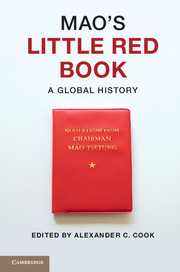Book contents
- Frontmatter
- Contents
- List of illustrations
- List of contributors
- Preface
- 1 Introduction
- 2 A single spark
- 3 Quotation songs
- 4 Mao quotations in factional battles and their afterlives
- 5 Translation and internationalism
- 6 Maoism in Tanzania
- 7 Empty symbol
- 8 The influence of Maoism in Peru
- 9 The book that bombed
- 10 Mao and the Albanians
- 11 Partisan legacies and anti-imperialist ambitions
- 12 Badge books and brand books
- 13 Principally contradiction
- 14 By the book
- 15 Conclusion
- Index
- References
9 - The book that bombed
Mao’s Little Red Thing in the Soviet Union
Published online by Cambridge University Press: 05 June 2014
- Frontmatter
- Contents
- List of illustrations
- List of contributors
- Preface
- 1 Introduction
- 2 A single spark
- 3 Quotation songs
- 4 Mao quotations in factional battles and their afterlives
- 5 Translation and internationalism
- 6 Maoism in Tanzania
- 7 Empty symbol
- 8 The influence of Maoism in Peru
- 9 The book that bombed
- 10 Mao and the Albanians
- 11 Partisan legacies and anti-imperialist ambitions
- 12 Badge books and brand books
- 13 Principally contradiction
- 14 By the book
- 15 Conclusion
- Index
- References
Summary
In early February 1967, the Soviet Union evacuated women and children from its embassy in Beijing. When the evacuees got off the plane at Moscow’s Sheremetyevo airport, hundreds of Muscovites were gathered to greet them. The arriving women gave their names – Olga, Natasha, Marina – and brief accounts of their departure from China. Babies in their arms, they told of running a gauntlet of hostile Red Guards to board their plane. At least one Chinese hurled a copy of the Little Red Book at the Russians, and it hit an eight-month-old girl on the head. Or so the Soviet press reported. Whereas for communists in many parts of the world, the Little Red Book functioned as a physical manifestation of the rejuvenation of leftism, for the Soviet Union it was anything but. While radicals from Berkeley to Bengal may have pocketed their books with hope and pride, nobody – really, absolutely nobody – in the Soviet Union would have been caught dead with one.
On the contrary, the book was universally perceived as a weapon. Its symbolism operated on several levels intellectually, politically, and socially, and had different implications in different contexts. Orthodox party members saw a rival ideology to refute; dissidents found an example of communism at its worst to brandish in their battle with the regime; ordinary people sensed a more concrete, literal threat. But all interpretations began from the same place: the Little Red Book and the Maoism it embodied were an assault, one that began rhetorically but could end physically.
- Type
- Chapter
- Information
- Mao's Little Red BookA Global History, pp. 147 - 164Publisher: Cambridge University PressPrint publication year: 2014
References
- 1
- Cited by



